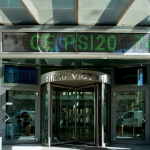Construction of new build for the middle class continues on the back burner
Building affordable homes for the Portuguese middle classes continues to be a back burner project for real estate developers because the government has not created sufficient conditions to make it economically viable.
The associations that represent real estate developers in Portugal say that high taxes, red tape and expensive parcels of land are stumbling blocks that are still too pervasive to achieve the goal of new affordable housing for Portugal’s middle classes according to Expresso.
And there also seems to be a slow take-up of new technologies that would allow properties to be built faster and cheaper.
Housing prices increased 120% between 2012 and 2022, partly as a result of strong demand from overseas investors, but also as a result of an absence of strong public policies over two decades.
For example, in Portugal, in order for an average middle class couple with a net salary of €2,280 to buy a two-bedroom 100m2 apartment on the outskirts of Lisbon where properties of this type typically go for €400,000, with a 30-year mortgage at 4.6%, the couple would have to pay €1,030 per month.
This means that 45% of the average couple’s joint income would have to go on paying the mortgage and his is clearly above the 30% of income advised by the Bank of Portugal.
Not only this, the couple would have to stump up a 10% up front deposit on the value of the loan – €40,000.
The private sector is keen on providing innovative techniques, materials and technologies to increase the efficiency, affordability and sustainability of housing construction.
And the Portuguese government has shown a willingness to support efforts from the private sector by fostering a regulatory framework that encourages the adoption of new techniques and solutions.
For instance, Estonian engineering firm Kodasema is working with the Portuguese government to develop modular KODA houses that can be assembled in a day.
João Carvalho, executive director of the Omega Group, a construction and engineering company, is one who believes that the way to provide new housing is to “build faster and cheaper”
In his opinion urgent measures required include amplifying the Urban Simplex programme by making it less confusing and controversial, as well as adopting building construction techniques that are more standardised and assembly line oriented.
Urban Simplex in the Portuguese real estate sector is a simplification and modernisation programme focused on reducing red tape and streamlining the entire planning application process at a municipal council level.
Buying a house without having to present a usage licence (licença de utilização) is one of this programme’s 2024 real estate market innovations. Other new regulations recently introduced aim to increase housing supply, reduce costs, and streamline transactions.










